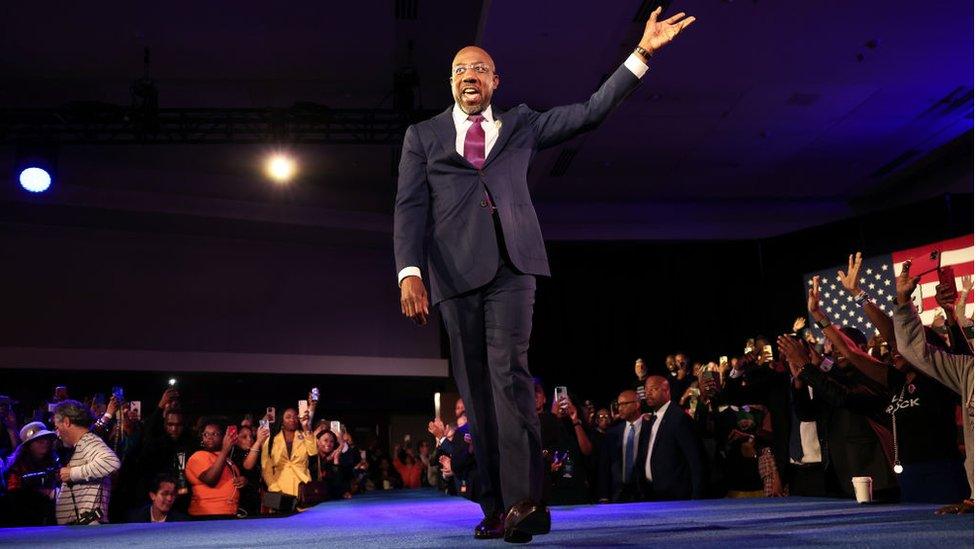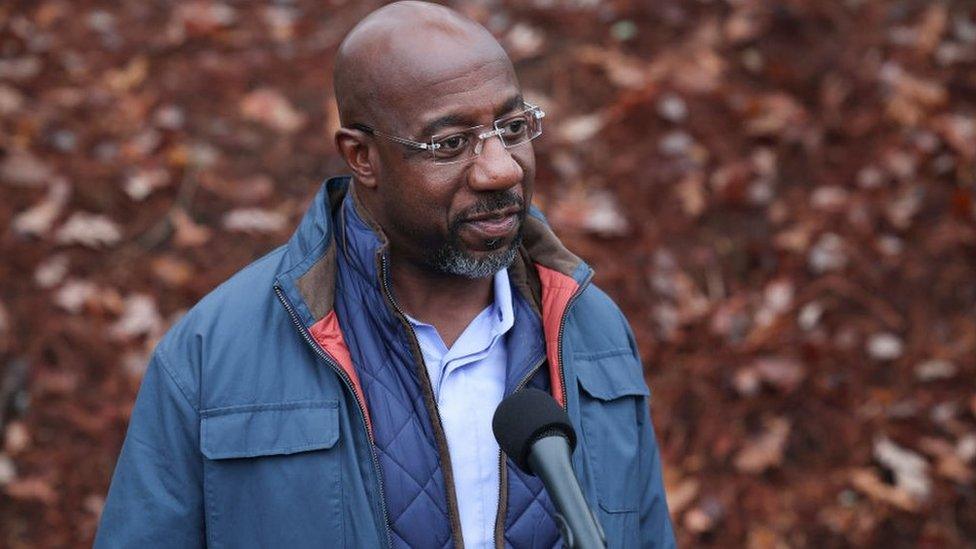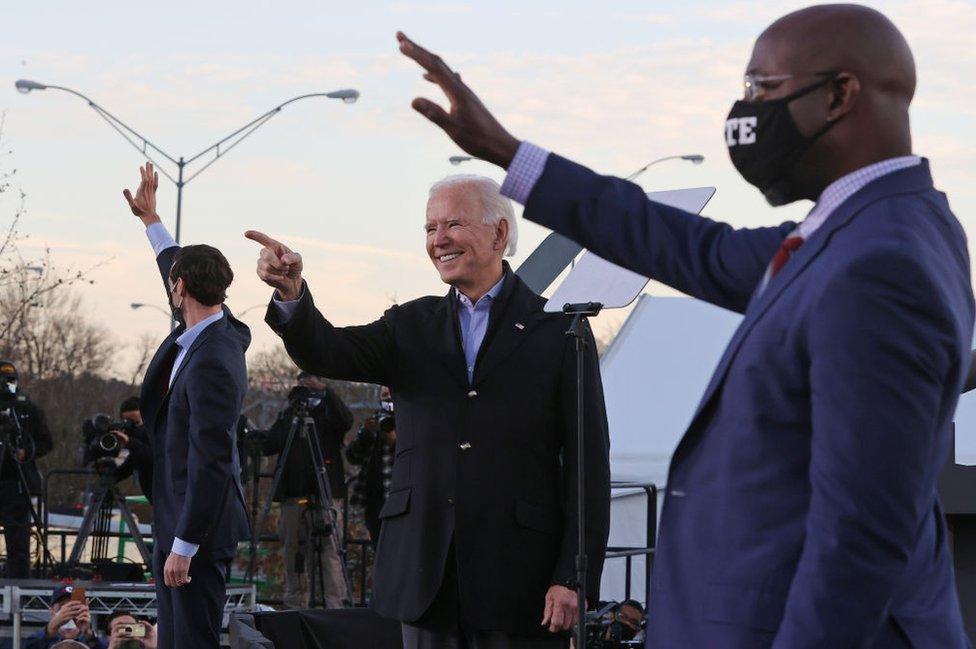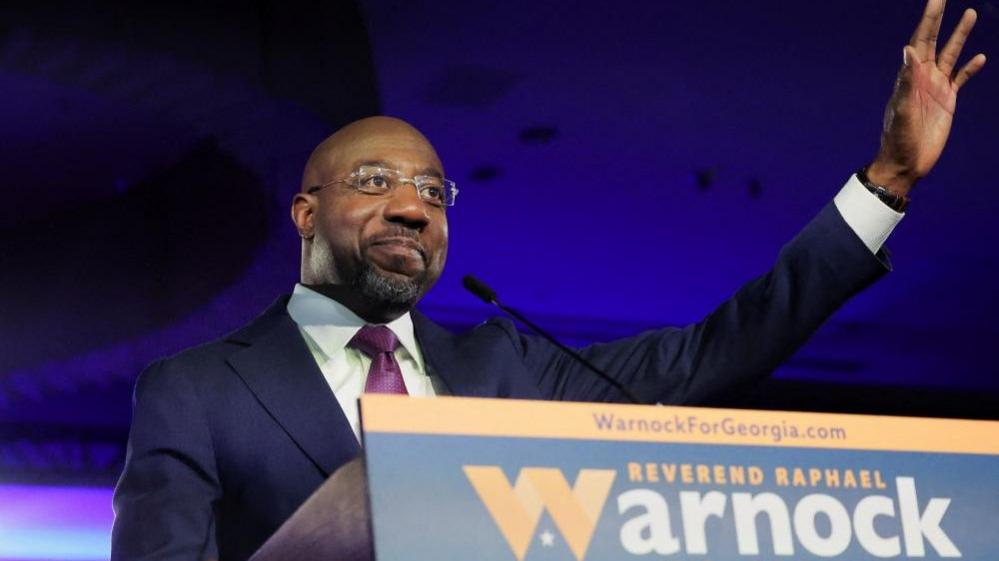Georgia Senate runoff vote: What Warnock's win means for him, the Senate and Georgia
- Published

US Senator Raphael Warnock has won re-election - and handed the Democratic Party some breathing room
It took an extra month, but the 2022 midterm elections have officially come to a close. With Raphael Warnock's re-election in Georgia, Democrats not only maintain control of the US Senate, they expand their margin in the chamber by one seat.
When combined with less-than-expected losses in the House of Representatives and success in many governor races, Democrats will be mostly satisfied with the overall results - and Republicans left wondering what might have been.
Americans across the country went to the polls in record numbers during these elections, but on Tuesday Georgia and its Senate run-off were centre stage. Here are five takeaways from the Democratic victory.
Democrats have some Senate breathing room
For the past two years, Democrats have had effective control over the US Senate thanks to the chamber's 50-50 split and Vice-President Kamala Harris's tie-breaking vote. They haven't had total control, however.
Due to a power-sharing agreement between the two parties, membership in Senate committees has been equally divided, which gave Republicans the ability to slow down legislation, block committee subpoenas, and delay confirmation of Joe Biden's executive and judicial appointments.
Mr Warnock's win changes all that. And while opportunities for legislative successes are limited given Republican control of the House of Representatives, Democrats can pick up the pace in appointing liberal judges to lifetime seats on the federal courts.
Full Democratic control will also make Ms Harris's life easier, as she no longer has to stay close to the Capitol to break ties - which she did 26 times over the past 22 months.
Centrist Democrat Joe Manchin of West Virginia may also be breathing a sigh of relief, as he'll have greater opportunities to break with Democrats and vote more in line with his conservative-dominated state without garnering the white-hot fury of the liberal base. With his own re-election looming in 2024, he has already said that will be a welcome change.
Georgia is a bona fide swing state
In November 2020, Joe Biden became the first Democratic presidential candidate to carry Georgia since Bill Clinton in 1992. Two months later, on the eve of the 6 January attack on the US Capitol, Mr Warnock and Jon Ossoff won run-offs for the state's two Senate seats, delivering a surprise majority to the party in the chamber.
Democrats were exuberant about the possibilities in a state that had been reliably conservative for decades - but the initial 2022 midterm results dashed those hopes. Republicans swept every major state-level office, including the governorship, picked up one House of Representatives seat and maintained control of the state legislature.
Mr Warnock's Senate re-election, however, provides further evidence that Democrats will continue to be competitive in the state - and that in 2024 the party's presidential nominee will have a realistic chance of taking the state's 16 electoral votes.

Mr Warnock's win also positions his party slightly better for 2024 elections
Tuesday's results suggest Georgia could end up more like Virginia than neighbouring North Carolina, with Mr Warnock's victory representing an electoral trend rather than an isolated blip.
In 2008, Barack Obama won both states after years of Republican domination. The former now has two Democratic senators, and the party has carried it in every election since then - a feat Democrats have yet to accomplish in North Carolina.
Democratic Senate outlook in 2024 improves
To put it bluntly, the map of Senate contests for Democrats in 2024 is brutal. The party has to defend Democratic-controlled seats in conservative leaning states like Mr Manchin's West Virginia, Montana and Ohio. They also have at-risk incumbents to protect in Nevada, Arizona and Wisconsin - states Democrats battled over this year (and, in Wisconsin's case, lost).
Meanwhile, the only Republican-held seats even marginally at risk are in Texas, where Democrats haven't won in decades, and Florida, which is trending more conservative in recent years.
If Democrats want to continue to control the Senate in two years, they're going to need all the help they can get - and Mr Warnock's win gives them at least some margin for error. Depending on who wins the White House in 2024, Republicans now will have to flip either one or two seats to take the chamber.
A Democratic star on the rise
Mr Warnock has now won four elections - two general campaigns and two run-offs - in a key swing state in just two years.
At 53, he's relatively young for a politician, particularly compared to octogenarian Joe Biden. He has a Southern preacher's cadence and charisma, and as minister at Ebenezer Baptist Church in Atlanta, is following in the footsteps of civil rights icon Martin Luther King, Jr.
He's shown an ability to boost black voter turnout and attract suburban white voters - two key parts of the Democratic electoral coalition.
It won't be long until Mr Warnock's name starts coming up in discussions about future Democratic presidential contenders - perhaps as early as 2024, if Mr Biden chooses not to run for re-election.

Mr Warnock may now find himself spoken of as a future presidential contender - especially if Joe Biden doesn't run in 2024
There's a saying that every senator wakes up and sees a future president in the mirror. And if Mr Warnock does harbour presidential ambitions, the proposed new Democratic primary schedule that includes Georgia and neighbouring South Carolina at the head of the pack would set up rather nicely for him to get out of the starting gate quickly.
Another Trump setback
More than perhaps any other candidate in the 2022 midterms, Herschel Walker was Trump's creation. He gave the former football star a prominent speaking role at the 2020 Republican National Convention. He repeatedly encouraged him to run for the Senate and elevated him in a crowded primary field against more established politicians, despite concerns by some party leaders that he was a flawed candidate with a mass grave of skeletons in his closet.
Mr Walker's election campaign was duly bedevilled by allegations of domestic abuse and involvement in multiple abortions, despite him having become an outspoken opponent of the procedure.
Mr Walker's defeat once again calls into question Mr Trump's political judgement, as well as the wisdom of nominating celebrity outsider candidates with no previous campaign experience - the kind of candidate Mr Trump was in 2016.
Republicans wondering if their party should head in a different direction when choosing a 2024 presidential nominee have even more to chew on now.
Related topics
- Published7 December 2022
